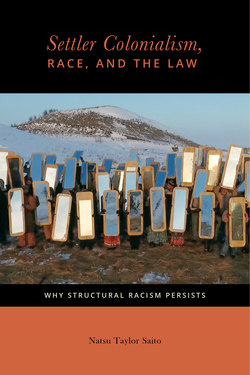Читать книгу Settler Colonialism, Race, and the Law - Natsu Taylor Saito - Страница 17
На сайте Литреса книга снята с продажи.
A Story of Progress
ОглавлениеThe versions of US history most commonly presented in education and entertainment are explicitly Eurocentric, often beginning with a reference to Christopher Columbus’s “discovery” of the Americas before moving quickly past the Pilgrims and Puritans to the “pioneers” who “settled” the West.4 Like the origin stories of other settler states, it begins with the arrival of the colonizers, rendering invisible the societies being displaced and replaced, or recasting them as part of the wilderness transformed by the settlers’ “civilizing mission.”5 It is a triumphal tale of Europeans who “braved the wilderness”—and its “roaming savages”—to transform “wastelands” into agricultural bounty. Their sacrifices enabled the development of the cash crops and mineral resources that fueled the industrial revolution in the United States and its eventual rise to global economic dominance.6 As summarized by President Trump in his 2018 commencement address at the Naval Academy, “our ancestors trounced an empire, tamed a continent, and triumphed over the worst evils in history.”7
The founders’ desire for democratic governance and religious freedom is emphasized in this story, the country’s population growth and territorial expansion attributed to their righteousness. The early Angloamerican colonists’ assertion of “a pre-emptive right to the continent,” embodied in colonial charters that “designated the Pacific Ocean . . . as the western boundary of the several colonies,” and their presumption of sovereignty over territory they had never seen8 provide the ideological foundation for their subsequent appropriation—and continuing occupation—of the continent.9 We are presented with color-coded maps that take us from sea to shining sea, from the original thirteen colonies, through the Louisiana Purchase and the annexation of northern Mexico, to the Pacific coast.
This was all made possible, we are told, by the European immigrants whose experiences set the stage for the narrative’s embrace of an assimilative pluralism. Until recently, at least, the story emphasized the United States as a “nation of immigrants.”10 This characterization underscores the desirability of being an American—why else would so many people go to such lengths to come here?—and suggests that American society has always been open to people of diverse backgrounds. It is a framing that conveniently omits the selectivity with which voluntary immigrants have been admitted and elides the histories of both those who were here all along and those who were forced to migrate.
This is a narrative of constant and inevitable progress that asserts its universality and overwrites the stories of all those it encounters. Its world is anthropocentric and hierarchically structured, with humans second only to a presumptively male God who instructs them to exercise “dominion . . . over every living thing that moveth upon the earth.”11 For those who reject the religious framing, the hierarchy nevertheless remains, with civilization or science replacing God at the pinnacle. Once this paradigm is accepted, it is equally logical to envision and construct hierarchical relations among humans, with some closer to God—or scientific “truth”—and others closer to nature.
Given this framing, it is not surprising that settler societies would be organized in a patriarchal and hierarchical manner. Likewise, as everyone is assigned a particular place in this order, it is not surprising that both individual and social identities tend to be understood as singular and exclusive rather than multiple, overlapping, or interpenetrating. “Rationality,” particularly in the form of science and technology, provides the path to conquering nature, and therefore is cast as the basis of civilization. History is the record of linear human “progress,” and Western civilization represents the highest stage of human development.12
The American master narrative takes this a step further, positing the United States as the culmination of Western civilization, the product of a genealogy that, in anthropologist Eric Wolf’s words, takes us from ancient Greece and Rome to Christian Europe, from the Renaissance and the Enlightenment to political democracy and the industrial revolution.13 “Industry, crossed with democracy, in turn yielded the United States, embodying the rights to life, liberty, and the pursuit of happiness.”14 In this telling, historic injustices are inadvertent rather than constitutive, the growing pains of an emergent democracy mitigated by the presumption that those in power were acting for a higher purpose and in accordance with the standards of their time.15 As Israeli historian Benny Morris put it, “Even the great American democracy could not have been created without the annihilation of the Indians. There are cases in which the overall, final good justifies harsh and cruel acts in the course of history.”16
